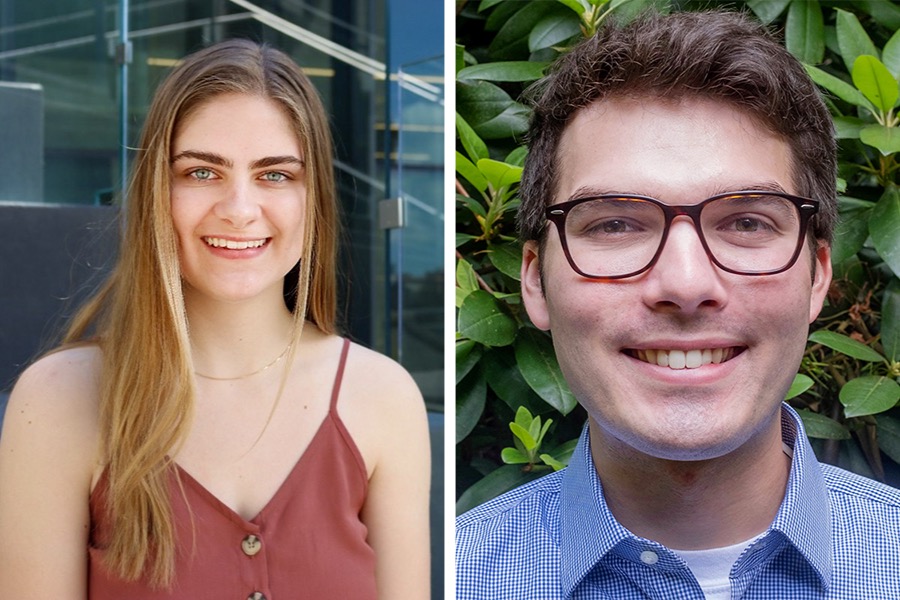
Two CEE Students Named Fullbright Scholars
Two Civil and Environmental Engineering students have been selected as grant recipients for the U.S. Fulbright Student Program's 2024-25 competition cycle. The program, in partnership with over 140 countries, allows grantees to conduct research, pursue a course of study at the graduate level, or teach English abroad in one country of their choosing.
Katie Hart
Katie Hart graduated with her bachelor’s degree in civil and environmental engineering with an additional major in engineering and public policy. She will use her Fulbright to study for her master’s degree at the Ostbayrische Technische Hochschule Amberg-Weiden in Amberg, Germany.
There, she will continue learning about environmental engineering and public policy, with a special focus on clean energy. She is interested in Germany’s energy policy and how they have been transitioning toward more renewable sources of energy. They have had an interesting transition, she said, as they have had to produce more coal to make up for energy lost as nuclear power plants are decommissioned, and Hart wants to know what the United States can understand from this experience. She wants to collaborate with energy policy experts across the world to learn how the world can transition to clean energy at the international level in order to mitigate climate change.
Her interest in clean energy was sparked by a research experience and further developed by classes both in the Department of Civil and Environmental Engineering. She also studied abroad in Rome last spring: “It was an amazing experience that gave me a taste of living and learning in a new country,” she said.
Earlier this year, she was honored with the George Washington Award, recognizing her academic excellence and leadership.
“I think many CMU students would understand the experience of holding themselves to high academic and professional standards, and we might not always stop and take the time to feel proud of what we’ve accomplished, whether it reaches our standards or not,” Hart said. “Receiving the Fulbright is a reminder to me to take time and celebrate my time in college and what I have done, as well as thank my mentors, professors, family and friends who had such an impact on my time here.”
Ben Therrien
Ben Therrien, a current Ph.D. candidate pursuing a joint degree in civil and environmental engineering and in engineering and public policy, will be traveling across the European Union on his Fulbright award.
There, he will be completing his dissertation, in which he seeks to understand agricultural nanotechnology through two main perspectives: through understanding how the technology is developed, and through investigating how risks and policies associated with the new technology are communicated. In particular, he will be working on the last chapter of his dissertation, in which he will speak with stakeholders across Europe to see how his communication strategy performs and what risks the stakeholders are sensitive to. He will compare these communication sensitivities to those of U.S. stakeholders, because, he said, “Developing a unified communication and policy framework for new technologies, like nanotechnology, can help support our mutual food security goals into the future.”
Therrien will work with researchers from primarily three universities: the Swedish University of Agricultural Sciences in Sweden, Ludwig Maximilian Institute of Munich in Germany, and Łódź University of Technology in Poland. Germany and Poland have prominent agricultural sectors, and Sweden has a history of risk communication work in agricultural and food sciences.
Therrien was inspired to apply for the Fulbright because of his experience as a joint-degree student, which has taught him to appreciate how technology is developed along with the roles of risk communication and policies regarding that technology. “I think that informing the public about science and technology is an important part of engineering,” he said. “My Fulbright project leverages my technical understanding of nanotechnology and allows me to put my behavioral and decision science training into practice as I work toward my science communication goals.”
He thanked the CMU community for the support that led to the award. “Being a Fulbright Schuman Scholar is an incredible honor,” he said. “I owe a huge debt of gratitude to my advisers in EPP and CEE for supporting my research goals, to CMU's Office of Research and Scholar Development for helping me throughout the application process, and to my peers who inspire me to take on new challenges!”